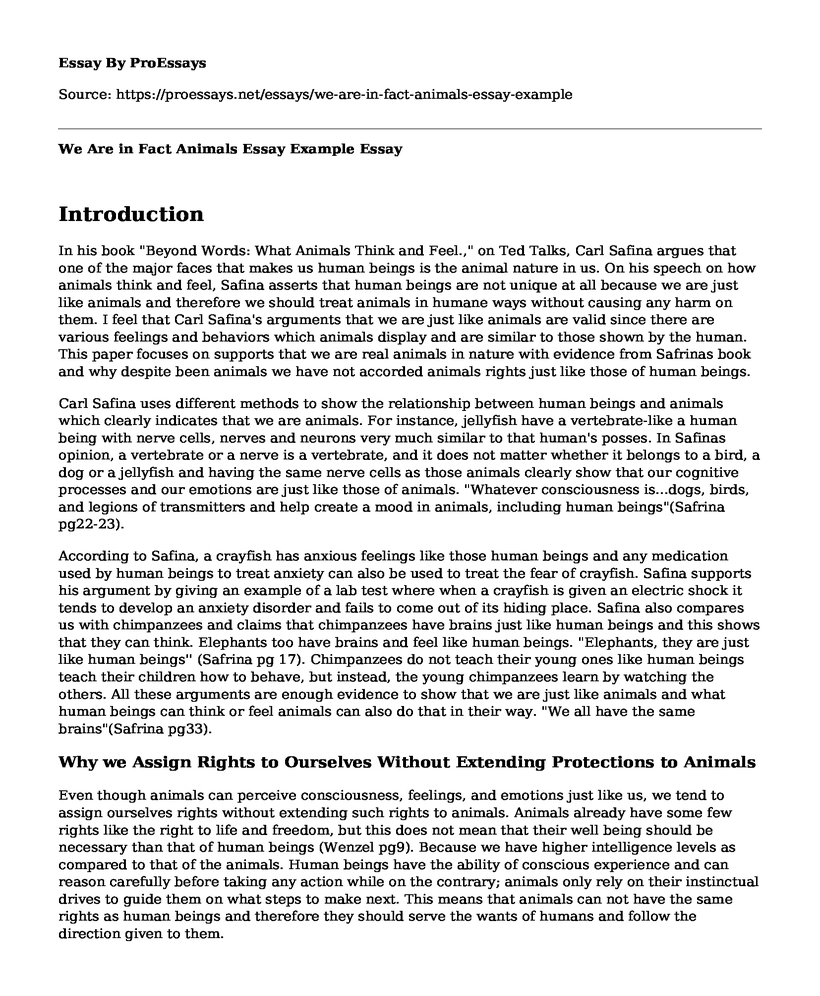Introduction
In his book "Beyond Words: What Animals Think and Feel.," on Ted Talks, Carl Safina argues that one of the major faces that makes us human beings is the animal nature in us. On his speech on how animals think and feel, Safina asserts that human beings are not unique at all because we are just like animals and therefore we should treat animals in humane ways without causing any harm on them. I feel that Carl Safina's arguments that we are just like animals are valid since there are various feelings and behaviors which animals display and are similar to those shown by the human. This paper focuses on supports that we are real animals in nature with evidence from Safrinas book and why despite been animals we have not accorded animals rights just like those of human beings.
Carl Safina uses different methods to show the relationship between human beings and animals which clearly indicates that we are animals. For instance, jellyfish have a vertebrate-like a human being with nerve cells, nerves and neurons very much similar to that human's posses. In Safinas opinion, a vertebrate or a nerve is a vertebrate, and it does not matter whether it belongs to a bird, a dog or a jellyfish and having the same nerve cells as those animals clearly show that our cognitive processes and our emotions are just like those of animals. "Whatever consciousness is...dogs, birds, and legions of transmitters and help create a mood in animals, including human beings"(Safrina pg22-23).
According to Safina, a crayfish has anxious feelings like those human beings and any medication used by human beings to treat anxiety can also be used to treat the fear of crayfish. Safina supports his argument by giving an example of a lab test where when a crayfish is given an electric shock it tends to develop an anxiety disorder and fails to come out of its hiding place. Safina also compares us with chimpanzees and claims that chimpanzees have brains just like human beings and this shows that they can think. Elephants too have brains and feel like human beings. "Elephants, they are just like human beings'' (Safrina pg 17). Chimpanzees do not teach their young ones like human beings teach their children how to behave, but instead, the young chimpanzees learn by watching the others. All these arguments are enough evidence to show that we are just like animals and what human beings can think or feel animals can also do that in their way. "We all have the same brains"(Safrina pg33).
Why we Assign Rights to Ourselves Without Extending Protections to Animals
Even though animals can perceive consciousness, feelings, and emotions just like us, we tend to assign ourselves rights without extending such rights to animals. Animals already have some few rights like the right to life and freedom, but this does not mean that their well being should be necessary than that of human beings (Wenzel pg9). Because we have higher intelligence levels as compared to that of the animals. Human beings have the ability of conscious experience and can reason carefully before taking any action while on the contrary; animals only rely on their instinctual drives to guide them on what steps to make next. This means that animals can not have the same rights as human beings and therefore they should serve the wants of humans and follow the direction given to them.
Additionally, animals are not part of the moral society neither do they have any sense of moral consciousness's for the human beings, they have moral ideas, and they can clearly understand the difference between what is wrong and what is right. Humans can realize that they cannot do something's because their morals are against them and it doesn't matter whether the victim has any rights or not.
Lastly, human beings can own any property hence the need to have the right to legal property ownership. On the other hand, animals can not own any property and claim it as their own. This means that human beings can own animals but animals cannot own human beings hence they are subject to serve human beings and therefore they cannot have the same rights as those of human beings (Wenzel pg9).
Conclusion
In conclusion, human beings have very many features, feelings and thinking that are similar to that of animals hence they are animals in nature. However, the difference between animal and human beings regarding intelligence, morality and property ownership makes human beings have rights as compared to those of animals hence the animals are subject to serve humans.
Works Cited
Safina, Carl. Beyond Words: What Animals Think and Feel. NewYork: Henry Holt & Co,2015
Wenzel, G. W. (1991). Animal rights, human rights: Ecology, economy, and ideology in the Canadian Arctic. University of Toronto Press.
Cite this page
We Are in Fact Animals Essay Example. (2022, Nov 20). Retrieved from https://proessays.net/essays/we-are-in-fact-animals-essay-example
If you are the original author of this essay and no longer wish to have it published on the ProEssays website, please click below to request its removal:
- Essay on the Objectification of Women's Bodies
- Paper Example on Effects of Binge Drinking on the Academic Performance Of Students
- Articles Analysis Essay on Methylenedioxymethamphetamine
- Paper Example on Stigmatization of Jail Victims: 5-Year Evaluation Study
- Creating Safe Spaces: Ending Violence in Neighborhoods - Essay Sample
- Essay Example on 1999 Columbine High School Massacre: 12 Dead, Many Injured
- Enhancing Criminal Justice and Policing: A Comprehensive Review and Call for Further Research







